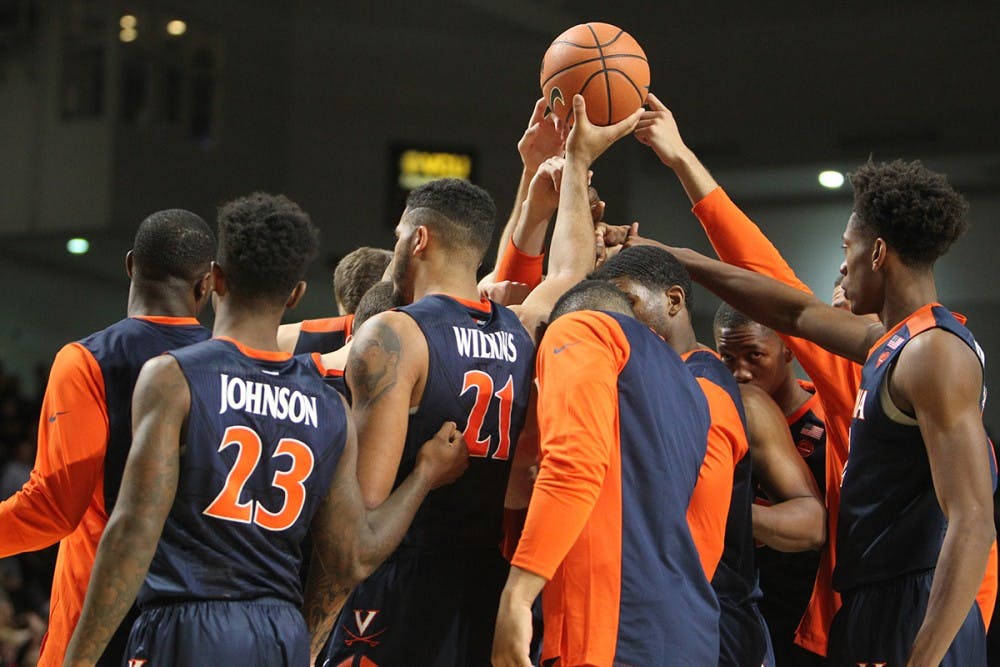It’s basketball season, and the University is ready for some intense games from both the men’s team — currently at No. 1 in the ACC entering the NCAA tournament — and the women’s team — entering the NCAA tournament at No. 10. While University students are bound to be chowing down on pizza and wings courtside or by the TV, the University’s basketball players are keeping an eye on the foods they’re eating.
Being an athlete requires not only the skills and the training, but also an understanding of which foods to eat.
“Because athletes tend to expend a lot more energy than non-athletes, [they] consume more food overall to provide energy for the physical activity performed as well as to help the body recover,” Steve Malin, an assistant professor in the kinesiology department, said in an email. “The type of calories athletes require may differ based on whether the athlete is more aerobic or power based.”
According to Director of Sports Nutrition Randy Bird some basketball players eat 4,000 to 5,000 calories per day.
“Besides quantity, [players] focus on carbohydrates for energy, protein to repair their muscles from the damage of workouts, and foods that help their body handle the stress they put on it,” Bird said in an email.
Basketball combines both aerobic and power-based dietary needs. According to Malin, who has taught classes on nutrition in the past, aerobic athletes need more carbohydrates in their diets to fuel muscles during high-intensity exercise. Carbohydrates, which are stored as glycogen in the body, help muscles to contract during exercise.
At the same time, basketball players must ensure they get a hefty amount of protein in their diets. Protein aids the body with a variety of functions, including improving immune health and muscle growth.
“Basketball players are quite aerobic in nature, however, they are also explosive in their movement, so focus on adequate energy intake in the form of carbohydrate and protein will foster good performance and recovery,” Malin said.
Basketball players aren’t alone in this need to maintain their diets. Along with other athletes at the University, they have access to an athletic dining hall at John Paul Jones Arena, open Sunday through Thursday for dinner, where the meals are catered more towards people in need of high-protein and high-carbohydrate diets.
What a typical basketball player eats in a day depends on their specific goals, whether the game is in season and the day, according to Kelly Rossi, associate director of Sports Nutrition at the University.
Timing is another key factor players must consider, especially in competition season. Many athletes focus on eating during a two-hour period of the day known as the “critical window.”
“This time period is typically within two hours post-exercise,” Malin said. “If these nutrients aren’t consumed and athletes have two-a-day practice or games back-to-back days, inadequate food consumption following exercise may make it difficult for the athlete to ‘re-fill’ nutrients in the body that helps it athletically perform.”
Before and after practices, players eat small snacks to fuel themselves – chocolate milk, protein shakes, fruit, energy bars and trail mix are common foods. These are often provided by nutritionists such as Rossi and Bird, who help athletes determine their dietary needs and goals.
“The players control what they eat,” Bird said. “I educate them on best fueling strategies for them as an individual. For some of the guys, it is a detailed plan of what foods to eat when. For others, it is specific guidelines of how to fuel around practice/workouts.”
Sports nutritionists like Rossi and Bird meet with athletes, sometimes individually and sometimes as a team, to advise them on specific guidelines, general strategies or detailed plans, helping players set personal goals for both diet and exercise. Both basketball teams meet with Rossi or Bird on a daily basis.
“Athletes have a great deal of control over their diets as they have a choice of where and what to eat,” Rossi said in an email. “However, they have very limited time to get those foods, which can make it quite challenging. I am able to help athletes navigate the challenging time constraints and find the best foods for their sport in the most efficient way possible.”
The challenges of eating right don’t end with the season. In the immediate post-season, diets are more lax, but once off-season training begins, athletes must become more strict in what they eat. Without the correct nutrients, fatigue can set in more quickly, according to Rossi.
“If an athlete is not fueling their body, they are missing a piece of the puzzle that can make them the best athlete they can be,” Rossi said. “In games, this could mean bonking before the end of a game or not having the energy to push through an overtime to win. In training, this could mean an athlete isn’t able to push themselves to their full potential, which in turn, will decrease their performance as an athlete over time.”
“Cheat days,” or days where athletes can eat foods they normally restrict themselves from on normal days, are not uncommon, but could have some detrimental effects based on when the cheat day is, how many cheat meals an athlete eats or the number of cheat days leading into tournaments, according to Malin. Foods high in saturated fats and simple sugars should be consumed infrequently.
“In general, the safest approach is to avoid certain foods when competition stakes are high to keep the body ‘running optimally,’” Malin said. “This is often why you hear of athletes enjoying certain foods when their season is over.”
Being an athlete and maintaining a healthy balance of protein, carbohydrates and other food groups is a lot to balance, but it’s necessary for the players to achieve their highest potential.
“The analogy I use is a comparison between an athlete’s body and a high-performance car. The type of fuel matters,” Bird said. “The food they eat fuels and refuels their working muscles.”







